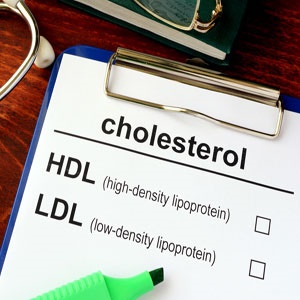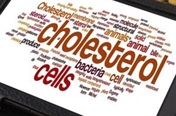
People are always told they should have regular cholesterol tests, as high cholesterol levels could have an impact on your heart health and your stroke risk.
But how do you make sense of the test results once you have received them?
The basics
Your total cholesterol level is the simplest chemical test of the liquid part of the blood - serum or plasma. This is also the sum of the cholesterol in all the different particles (lipoproteins) carrying cholesterol.
The most important particles are LDL (low-density lipoprotein – the bad cholesterol), HDL (high-density lipoprotein – the good cholesterol) and the triglyceride-rich particles carry some cholesterol as well.
What are triglycerides?
In short, this is the major form of fat stored by your body, and it is made up of three fatty acids and the fairly simple small molecule, glycerol.
The body produces cholesterol, and you also get it from the food you eat. Digestion of food makes the cholesterol and triglyceride available for absorption and transport in lipoproteins from the gut (chylomicrons) which are present in the blood for a few hours after a meal. The liver is responsible for most of the other lipoproteins.
The LDL is the "bad" cholesterol as it is associated with disease. HDL helps to remove cholesterol from tissues and transports it through your bloodstream, making it the "good" cholesterol as higher concentrations are associated with lower risk.
The screening test used to measure cholesterol levels is called a "lipid profile" and is usually done after a 9–12 hour fast. The National Institutes of Health recommend that everyone over the age of 20 should have his or her cholesterol levels checked at least once every five years, and more frequently if your cholesterol levels turn out to be high.
High cholesterol levels increase your chances of a heart attack or stroke as a result of a build-up of plaque inside the arteries.
In persons without serious inherited disorders, the risk is simply assessed by looking at the cholesterol and HDL cholesterol concentrations. Studies indicate that the ideal is a ratio of total cholesterol to HDL cholesterol of 4:1.
What does the term mg/dL mean, which is used to describe cholesterol levels?
It stands for milligrams of cholesterol per decilitre, which is one tenth of a litre or 100mL. This measurement is used in the United States and some other countries, but in South Africa and many other countries, we use millimoles per liter which is expressed as mmol/L.
The mg refers to the mass of cholesterol while the mmol/L refers to the numbers of particles and simple calculations can convert the one system to the other. To convert mg/dL to mmol/L, divide the figure by 38.7.
Here’s what your numbers mean, and whether you need treatment and/or lifestyle changes.
It has to be stressed that the tables below are merely an indication, and are not meant for self-diagnosis. All lifestyle changes and medication should be discussed with your doctor.
These numbers are also not absolute and there are many other factors your doctor will consider before deciding on treatment and lifestyle changes. Note that considering LDL and HDL separately improves the insight into risk.
Total cholesterol
Below 5mmol/L | Desirable level |
5 - 7.5mmol/L | Borderline to high risk |
7.5mmol/L or higher | High risk |
High HDL cholesterol
Higher than 0.9mmol/L (with desirable total cholesterol level) | No significant risk for heart disease or stroke. But if you have high blood pressure, if you’re a smoker, or if you have other risk factors for heart disease or stroke, this could change. Start adopting healthier lifestyle habits. |
Higher than 0.9mmol/L (with borderline to high cholesterol levels) | Your risk for a heart attack or stroke within 10 years is less than 20% if you’re young, but if you have high blood pressure, if you’re a smoker, or if you have risk factors for heart disease or stroke, your risk could be much higher. Start adopting healthier lifestyle habits, which should include more exercise, a low-fat diet and quitting smoking. |
LDL cholesterol
Lower than 3mmol/L | This is the ideal level for those without vascular disease. Otherwise, lower than 2.5mmol/L is known to be better for those with vascular disease. | No specific treatment necessary for cholesterol but it’s still important to follow a healthy lifestyle. |
3 - 5mmol/L | Borderline to high risk | Both lifestyle changes and medication could be recommended. |
Higher than 5mmol/L | High risk. Inherited cholesterol problems in this category are associated with premature heart disease in the family. | Further tests should be conducted to decide on the best line of treatment. |
Triglycerides
|
|
|
5 - 15mmol/L | Moderate to high risk | Lifestyle changes is advised. Lipid-lowering drugs (statins, fibrates) may be prescribed. |
Over 15mmol/L | High risk of pancreatitis, but also risk of vascular disease. | Medical attention is needed as there are high health risks in the short and long term. Dietary changes are very important. |
Reviewed by Prof David Marais, FCP(SA), Head of Lipidology at Groote Schuur Hospital and the University of Cape Town, January 2018
Image credit: iStock




 Publications
Publications
 Partners
Partners
















